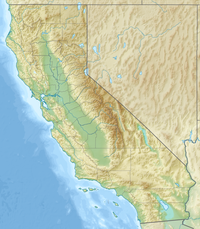| Old Survivor | |
|---|---|
 | |
 | |
| Species | Coast redwood (Sequoia sempervirens) |
| Coordinates | 37°47′34″N 122°10′29″W / 37.7928°N 122.1748°W / 37.7928; -122.1748 |
| Height | 250 ft (76 m) |
| Diameter | 26 ft (7.9 m) |
| Date seeded | 1549-1554 |
Old Survivor, also known as the Grandfather Tree, is the last remaining old-growth coastal redwood of the East Bay Redwoods that once populated the Oakland Hills in California.
Description
Old Survivor has a unique shaggy appearance with several large branches drooping outward from its sparse upper crown. The tree is much taller than the surrounding trees, all of which are second growth. Despite its name, the tree, which dates to 1549–1554, is actually young for an old-growth coastal redwood, many of which live between 1200 and 1800 years old or more. Between 7-12 years before Old Survivor was seeded, Spanish/Portuguese explorer Juan Rodríguez Cabrillo had led the first expedition to explore the coast of what is now California.
The tree can be observed at a distance from the York Trail of Leona Heights Park, or from the parking lot of Carl B. Munck Elementary School where there is a plaque detailing the tree's statistics and history.
History
From 1845 to 1860, logging of the coastal redwoods in the area for their valuable timber wiped out much of the dense coastal redwood forest that once populated the Oakland Hills of East Bay. A second wave of logging following the 1906 San Francisco earthquake further contributed to the forest's destruction, leaving only a few scattered pockets of old-growth redwoods left in the entirety of East Bay. Old Survivor's location on an exceptionally steep and rocky slope beside Horseshoe Creek made it unprofitable to log, and thus the tree was spared the fate of its neighbors.
In 1916, the land where the tree stands was purchased by the city of Oakland in order to preserve the remaining redwoods in the area.
The tree was rediscovered in 1969 by Oakland Parks naturalist Paul Covel in what was then McCrea Memorial Park (today called Leona Heights Park). A core ring count at the time made by Glen Strouse at Humboldt State University estimated the tree's age to be between 415 and 420 years old relative to 1969.
Old Survivor was designated a City of Oakland Historic Landmark on June 24, 1980.
In 2018, the documentary film Old Survivor celebrated the tree and reflected back on the history of Oakland's coastal redwood forests.
See also
References
- "Sequoia gigantea is of an ancient and distinguished family". Nps.gov. February 2, 2007. Retrieved August 7, 2012.
- Kelsey, Harry (1986). Juan Rodríguez Cabrillo. San Marino: The Huntington Library. pp. 145–55.
- Sylvia Linsteadt (January 1, 2017). "Old Giants: The Last Days of Oakland's Redwoods". Retrieved February 11, 2017.
{{cite magazine}}: Cite magazine requires|magazine=(help) - ^ "'Old Survivor' film documents Oakland's last original redwood". East Bay Times. October 4, 2018. Retrieved November 5, 2019.
- Herron Zamora, Jim (August 14, 2006). "The 'Grandfather' of Oakland's redwoods". San Francisco Chronicle.
- "Information about "Oakland Rewdoods - Old Survivor artticle (1969).jpg" on old survivor redwood tree - Oakland - LocalWiki". localwiki.org. Retrieved November 5, 2019.
- "List of Designated Landmarks | Historic Preservation | City of Oakland | California". www2.oaklandnet.com. Retrieved November 5, 2019.
- "Old Survivor Documentary: A Celebration of Oakland's Redwoods". Save the Redwoods League. October 10, 2018. Retrieved November 25, 2019.
- "Old Survivor Film Project – OaklandTrails.org". Retrieved November 25, 2019.
This tree-related article is a stub. You can help Misplaced Pages by expanding it. |